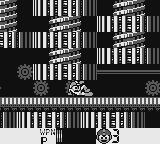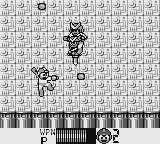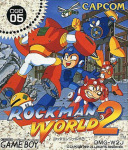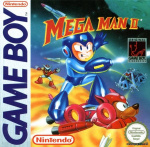Difference between revisions of "Mega Man II (GB)"
OlfinBedwere (talk | contribs) (→Screenshots) |
OlfinBedwere (talk | contribs) |
||
| Line 1: | Line 1: | ||
| − | |||
| − | |||
{{Infobox Game | {{Infobox Game | ||
| Title = Mega Man II | | Title = Mega Man II | ||
Revision as of 04:52, 28 May 2018
| Mega Man II | ||||||||
 |
||||||||
| ||||||||
Mega Man II is the second entry in the Game Boy Mega Man series, taking elements from Mega Man II (NES) and Mega Man III (NES). Dr. Wily has taken control of a time-travel machine, and brought back upgraded versions of some of his past Robot Masters, along with a mysterious robot named Quint, who bears an odd resemblance to Mega Man himself.
Unfortunately, Mega Man II is a case of one step forward, two steps back. This time we get full stages for the second set of Robot Masters, and the introduction of Rush, the slide move and energy tanks make things a lot more accessible than the punishingly difficult Mega Man: Dr. Wily's Revenge (GB). However, developers Biox (then known as Japan System House) went a little too far in the opposite direction, making the game barely any sort of challenge at all. On top of that, the level designs are just heavily simplified versions of those from the NES games, and the collision detection is pretty faulty. Overall, it's certainly a playable game and decent enough by the overall standards of the Game Boy library, but it's a below-par Mega Man outing.
Screenshots
Music
In stark contrast to its acclaimed NES namesake, this game's soundtrack is often considered to be one of the absolute worst in the entire history of videogaming. This reputation isn't entirely deserved, as Kenji Yamazaki provides some good compositions - the themes for the Air Man, Crash Man and Hard Man stages in particular stand out - which the various fan remixes of the game's soundtrack have demonstrated aptly. The big problem is that they appear to be rendered an octave or two higher than intended, and with overbearing percussion, making it unpleasant to listen to at times. There are also signs that the soundtrack was rushed, as the theme for Quint's stage is a grating five-second loop, and the Dr. Wily stage just re-uses the title screen music. On top of that, the game just uses the Game Boy's PCM channel as a third square wave channel, making it sound like a Master System or Game Gear game (not surprising, as all of Biox's previous games were on those two platforms), and the game's sound driver seems to be flawed, as sound effects can sometimes change the music, and the drums occasionally go off-sync.
Unlike most of the other Game Boy outings, this game uses original themes for the most part, though a couple of Yasuaki Fujita's tracks from the NES Mega Man III are re-used here; the first is the "Get a Weapon" theme, which is rendered faithfully enough (though an octave higher for some reason), and the second is the "Password" theme, which is heavily re-arranged and barely recognisable. This game's Top Man theme also sounds oddly like the NES Needle Man theme at points, suggesting that Yamazaki may have started out intending to adapt the NES soundtracks, but ended up not having the time to do so and so produced an original soundtrack.
Recording
Credits
- Ripper: Unknown
- Recorder: OlfinBedwere
- Game Credits:
- Not Credited Composer/Arranger: Kenji Yamazaki
- Not Credited Composer: Yasuaki Fujita
- Not Credited Programmer: Hiroto Nakamura
(Source: Kenji's website [1]; game lacks credits.)
Kenji Yamazaki's website lists him as the composer for this game. A former Biox employee has said that Hiroto Nakamura supplied them with the sound drivers they used for most of their 8-bit titles. Kenji has also said that Nakamura was the sound programmer he usually worked with, so he almost certainly handled sound programming for this game.
Game Rip
Ripping Game Boy music is a very arduous process that is beyond the scope of this site. The soundtrack was recorded using the Game Emu Player in foobar2000.
Releases
| ||||||||||||||||||||||||||||||||||||||||||||||||
Links
- mobygames.com/game/gameboy/mega-man-ii - MobyGames.
- gamefaqs.gamespot.com/gameboy/563279-mega-man-ii - GameFAQs.
- en.wikipedia.org/wiki/Mega_Man_II_(Game_Boy) - Wikipedia.
- Games Released In 1991
- Games Developed By Biox
- Games
- Mega Man II (GB)
- Games By Kenji Yamazaki
- Games By Yasuaki Fujita
- Games By Hiroto Nakamura
- Games That Use GBS
- Games Released In Japan
- Game Boy Games
- Games Published By Capcom
- Games Released In USA
- Games Released In UK
- Games With Missing Box Art
- Games Published By Nintendo
- Games Released In Germany










